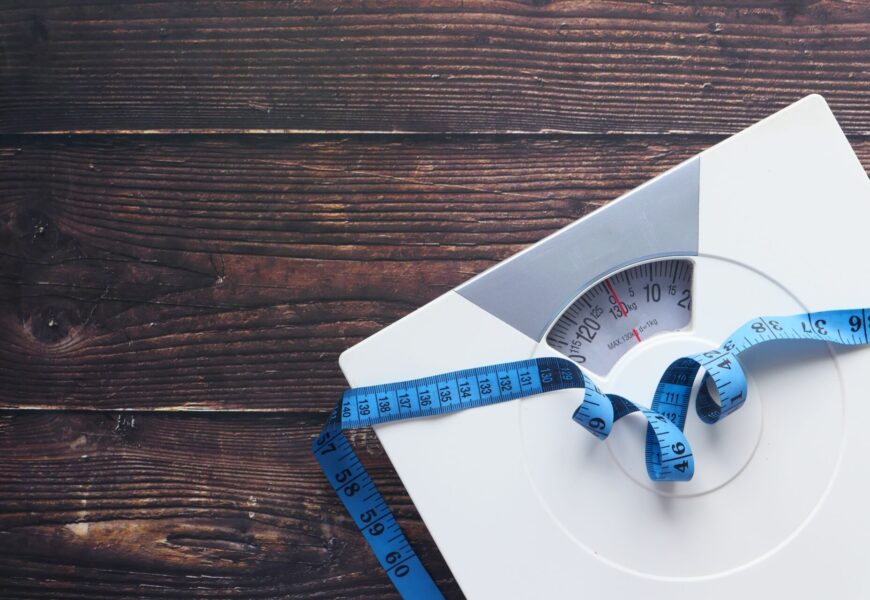In a world where health and wellness take center stage, many of us have asked ourselves, “When is the best time to weigh yourself?” It’s a question that carries more significance than you might think.
The truth is, stepping onto the scale isn’t just about seeing numbers; it’s about understanding our bodies and tracking progress on our health journeys.
The timing of these weigh-ins can make a significant difference in what those numbers tell us.
In this blog post, we’ll delve into the science and practicality behind finding the best time to weigh yourself.
We’ll explore morning and evening weigh-ins, discuss how often you should step on that scale, and reveal the correct techniques to ensure accurate results.
Moreover, we’ll touch on the things you shouldn’t weigh yourself down with, pun intended.
So, let’s embark on this journey to uncover the secrets of the best time to weigh yourself, ensuring that your efforts towards a healthier you are both informed and effective.
Best Time To Weigh Yourself
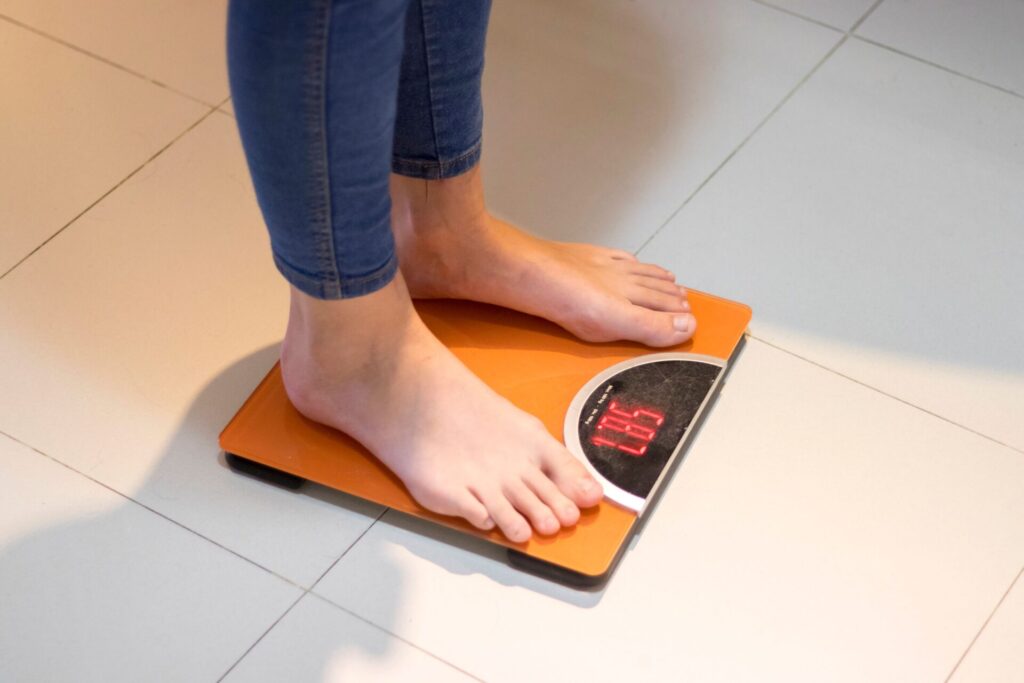
Morning Weigh-Ins
When it comes to figuring out the Best Time to Weigh Yourself, many people opt for the morning weigh-in. Why? Well, in the early hours, your body has usually been fasting for several hours during your sleep.
This means you haven’t eaten anything recently, and your body is in a relatively stable state.
This stability makes it easier to compare your weight from day to day, giving you a more consistent picture of your progress.
However, it’s essential to keep in mind that morning weigh-ins come with a few potential downsides.
Your body weight can naturally fluctuate a bit daily due to factors like hydration levels and even the food you ate the night before. So, don’t be surprised if you see small changes on the scale.
Another thing to note is that for some folks, stepping on the scale first thing in the morning can be a bit stressful and affect the accuracy of the reading, so it’s essential to approach it with a calm mindset.
Evening Weigh-Ins
In contrast to morning weigh-ins, some people prefer to step on the scale in the evening.
This choice has its own unique advantages when you’re trying to figure out the Best Time to Weigh Yourself.
Evening weigh-ins can provide a more accurate reflection of your daily weight fluctuations.
Throughout the day, you’ve likely consumed food and fluids, and your activity levels have varied. So, an evening weigh-in can help you understand how your choices during the day impact your weight.
But, there are some things to consider here as well. Your weight in the evening can be influenced by what you’ve eaten and how much you’ve drunk throughout the day. It can also be affected by your activity levels.
So, while evening weigh-ins can be great for keeping yourself accountable and understanding daily changes, they may not show your baseline weight as effectively as morning weigh-ins.
The choice between morning and evening weigh-ins ultimately depends on your goals and what works best for you in your pursuit of a healthier you.
How Often Should You Weigh Yourself?
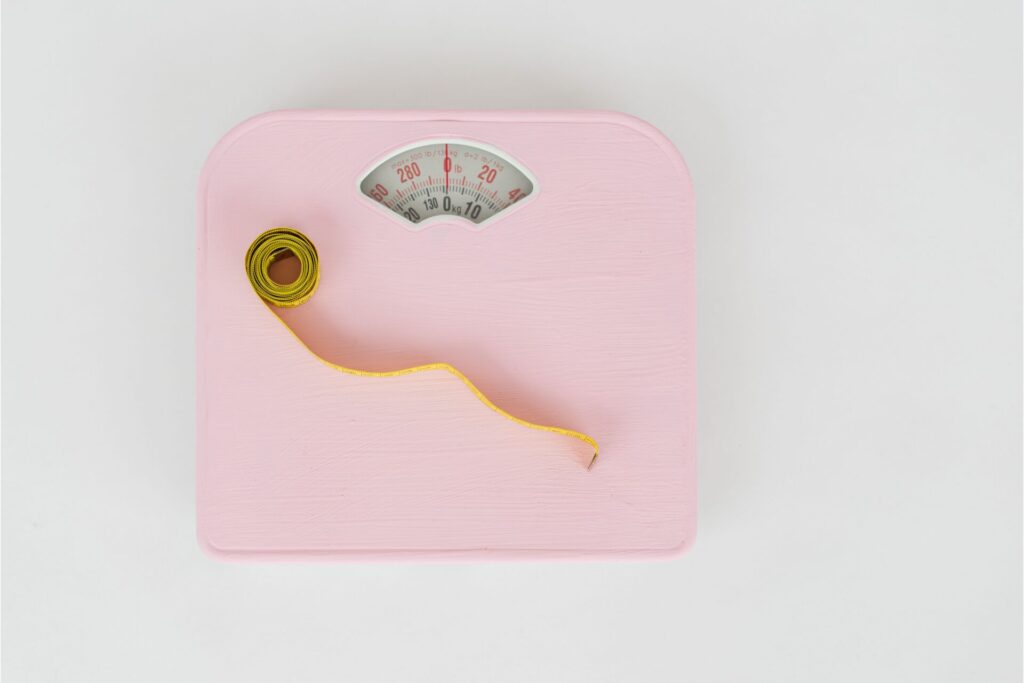
Daily Weigh-Ins: Pros And Cons
When it comes to deciding how often to step on the scale, daily weigh-ins might initially seem like a straightforward way to keep tabs on your maintenance or weight loss journey.
These daily check-ins offer immediate feedback, allowing you to stay closely connected to your progress.
You can quickly see how your choices from the previous day are impacting your weight. However, it’s crucial to approach daily weigh-ins with a healthy dose of caution.
One potential downside to daily weigh-ins is that they can sometimes lead to confusion and stress.
The numbers on the scale can fluctuate from day to day due to various factors like hydration levels, salty meals, and hormonal changes.
These fluctuations don’t necessarily reflect your true progress. For some people, the pressure of stepping on the scale every day can turn into an obsession, causing unnecessary stress and even unhealthy behaviors.
The goal of weighing yourself should be to track your health journey positively, not to create stress.
Weekly Weigh-Ins: Finding Balance
On the other hand, opting for weekly weigh-ins can provide a different perspective on your journey.
These less frequent check-ins give you a broader view of your overall progress, helping you see the bigger picture without getting caught up in the daily ups and downs.
They can reduce the mental strain that daily fluctuations can cause and help you avoid becoming overly fixated on your weight.
However, it’s essential to recognize that choosing weekly weigh-ins may require a bit more patience.
You might not see immediate changes, and it could be easier to lose track of your goals without more frequent reminders.
Weekly weigh-ins strike a balance between consistent tracking and preventing the stress associated with daily fluctuations.
They offer a more relaxed approach that can work well for many individuals seeking sustainable weight management.
How To Weigh Yourself Correctly
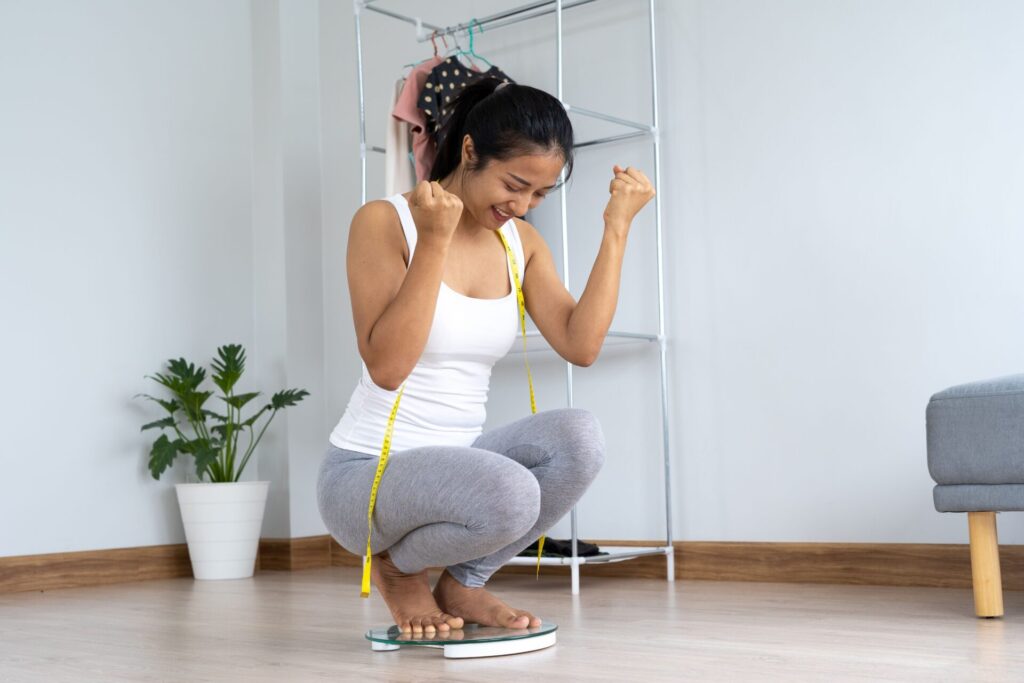
Choosing The Right Scale
When it comes to figuring out the best time to weigh yourself, your journey starts with picking the right scale.
You want a scale that you can trust to give you accurate readings. Digital scales are usually your best bet, as they tend to be more precise than those old mechanical ones with the dials.
But here’s the thing: make sure your scale is calibrated correctly. Calibration ensures that your scale is on the money with its measurements.
Check your scale for any signs of wear and tear, like cracked displays or wobbly platforms, as these things can mess with the accuracy of your weigh-ins.
Preparation Matters
Getting ready for your weigh-in is a simple but important step. You want your results to reflect your true progress, right?
So, here’s the deal: wear the same kind of clothing every time you step on that scale. Different outfits can add a few extra pounds, and we don’t want that.
Also, before you weigh yourself, try to make a pit stop at the bathroom.
Why? Well, because a full bladder can add a bit of extra weight that doesn’t have anything to do with your actual body changes.
So, wearing the same clothes and having an empty bladder will help you get more accurate results.
Mastering The Technique
Now, let’s talk about how you actually step on the scale. There’s a bit of an art to it if you want the best results, especially when you’re trying to pinpoint the best time to weigh yourself.
First things first, stand evenly on the scale.
Don’t put more weight on one foot than the other. Keep your feet close together, and don’t fidget around.
Try not to lean on anything nearby, like the bathroom sink, because that can mess with the readings.
And here’s the trick: wait for the scale to settle down and give you a stable reading. It might take a few seconds, but it’s worth it.
This way, you get the most accurate measurement of your weight without any weird fluctuations.
Remember, being consistent with how you use the scale is key when you’re trying to track your progress, especially if you’re wondering about the best time to weigh yourself.
When Should You Not Weigh Yourself?
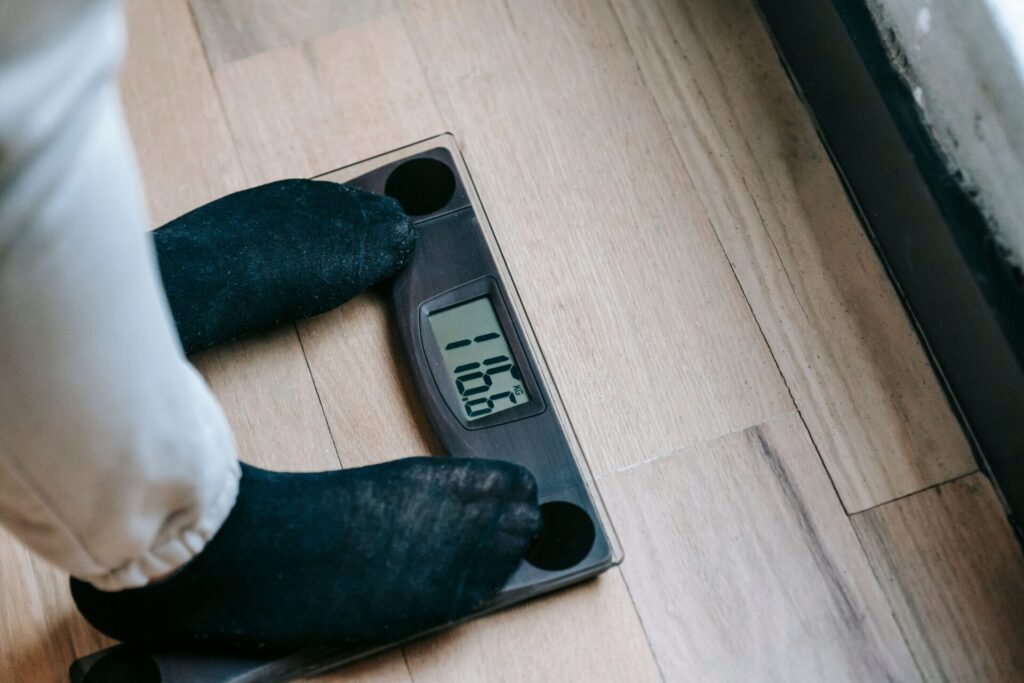
Food And Drinks
When it comes to figuring out the best time to step on that scale, it’s vital to understand how what you eat and drink can affect your weight.
Sometimes, after a hearty meal or when you’ve had a big glass of water, you might notice the numbers on the scale jump up a bit.
But here’s the thing: that increase isn’t about gaining fat; it’s just your body temporarily holding onto the weight of the food and beverages you’ve consumed.
So, if you want the most accurate weight measurement, wait a few hours after eating or drinking before you weigh yourself.
This gives your body time to process what you’ve consumed, and you’ll get a truer picture of your actual weight.
Emotional State
Your mood can also play a role in how much you weigh, and this is something to keep in mind when you’re trying to figure out the best time for your weigh-ins.
When you’re stressed or anxious, your body can react by changing cortisol levels, which may lead to temporary weight shifts.
Plus, your overall mental well-being can affect your weight throughout the day. Those ups and downs in your mood can cause your weight to fluctuate, even when you haven’t gained or lost any fat.
To get a more accurate reading on your weight, aim to weigh yourself when you’re feeling calm and emotionally stable.
After Exercise
Exercise is fantastic for your health, but it’s important to know that working out can temporarily affect your weight.
Right after you’ve finished a workout, your body might hold onto extra fluids as part of the muscle mass recovery process.
This can give you a higher number on the scale, but it’s not because you’ve gained fat. It’s just your body doing its thing.
To get a more consistent and accurate weight measurement, it’s a good idea to wait a bit after exercising before you step on the scale. Let your body return to its normal state, and you’ll get a better idea of your real progress.
Random Time Intervals
When it comes to weighing yourself, consistency is key.
If you hop on the scale at different times throughout the day, you’ll likely get confusing and unreliable results.
Your weight naturally goes up and down during the day due to various factors like meals, hydration, and physical activity.
To make the most sense of your weight trends, choose one specific time of day for your weigh-ins and stick to it.
This will help you keep track of your progress more effectively and make it easier to spot meaningful changes over time.
Obsessive Patterns
Let’s talk about the potential downside of obsessively weighing yourself.
Constantly hopping on the scale, day in and day out, can lead to unnecessary stress and anxiety.
Daily weight fluctuations are a normal part of life, and they may not always reflect your actual progress.
Instead of getting caught up in the ups and downs of daily weigh-ins, consider a less frequent approach, like weighing yourself weekly or biweekly.
This way, you can still keep an eye on your journey without becoming overly fixated on those daily numbers.
During Menstruation
If you’re someone who experiences menstruation, it’s essential to know that your hormonal changes during this time can affect your weight.
Sometimes, you might notice that the numbers on the scale go up due to temporary water retention.
It’s essential to remember that these changes aren’t about gaining fat; they’re related to your body’s natural processes.
During your period, it might be a good idea to take a break from frequent weigh-ins and focus on your overall health instead.
Monitoring your weight trends over time, rather than during your menstrual cycle, can provide a more accurate picture of your progress on your health and fitness journey.
Closing Thoughts
The journey to better health and achieving your fitness goals revolves around understanding “When Is the Best Time to Weigh Yourself.”
Remember, there’s no one-size-fits-all answer; it’s about finding what works best for you.
Whether you opt for morning weigh-ins to track your fasting state or prefer evening weigh-ins for a snapshot of your daily variations, consistency is key.
Embrace the idea that progress isn’t always linear and daily fluctuations are normal. Moreover, don’t let the number on the scale define your worth or happiness.
Consider other markers of health and well-being, such as how you feel, your energy levels, and your overall fitness.
So, keep experimenting, consult experts if needed, and, most importantly, prioritize a balanced approach to your health and fitness journey.
The “Best Time to Weigh Yourself” is ultimately the time that supports your weight loss goals while nurturing your mental and emotional well-being.

